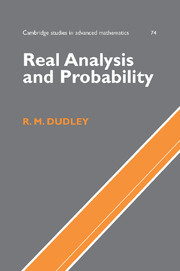Book contents
- Frontmatter
- Contents
- Preface to the Cambridge Edition
- 1 Foundations; Set Theory
- 2 General Topology
- 3 Measures
- 4 Integration
- 5 Lp Spaces; Introduction to Functional Analysis
- 6 Convex Sets and Duality of Normed Spaces
- 7 Measure, Topology, and Differentiation
- 8 Introduction to Probability Theory
- 9 Convergence of Laws and Central Limit Theorems
- 10 Conditional Expectations and Martingales
- 11 Convergence of Laws on Separable Metric Spaces
- 12 Stochastic Processes
- 13 Measurability: Borel Isomorphism and Analytic Sets
- Appendix A Axiomatic Set Theory
- Appendix B Complex Numbers, Vector Spaces, and Taylor's Theorem with Remainder
- Appendix C The Problem of Measure
- Appendix D Rearranging Sums of Nonnegative Terms
- Appendix E Pathologies of Compact Nonmetric Spaces
- Author Index
- Subject Index
- Notation Index
- References
7 - Measure, Topology, and Differentiation
Published online by Cambridge University Press: 06 July 2010
- Frontmatter
- Contents
- Preface to the Cambridge Edition
- 1 Foundations; Set Theory
- 2 General Topology
- 3 Measures
- 4 Integration
- 5 Lp Spaces; Introduction to Functional Analysis
- 6 Convex Sets and Duality of Normed Spaces
- 7 Measure, Topology, and Differentiation
- 8 Introduction to Probability Theory
- 9 Convergence of Laws and Central Limit Theorems
- 10 Conditional Expectations and Martingales
- 11 Convergence of Laws on Separable Metric Spaces
- 12 Stochastic Processes
- 13 Measurability: Borel Isomorphism and Analytic Sets
- Appendix A Axiomatic Set Theory
- Appendix B Complex Numbers, Vector Spaces, and Taylor's Theorem with Remainder
- Appendix C The Problem of Measure
- Appendix D Rearranging Sums of Nonnegative Terms
- Appendix E Pathologies of Compact Nonmetric Spaces
- Author Index
- Subject Index
- Notation Index
- References
Summary
Nearly every measure used in mathematics is defined on a space where there is also a topology such that the domain of the measure is either the Borel σ-algebra generated by the topology, its completion for the measure, or perhaps an intermediate σ-algebra. Defining the integrals of real-valued functions on a measure space did not involve any topology as such on the domain space, although structures on the range space ℝ (order as well as topology) were used. Section 7.1 will explore relations between measures and topologies.
The derivative of one measure with respect to another, dγ/dμ = f, is defined by the Radon-Nikodym theorem (§5.5) in case γ is absolutely continuous with respect to μ. A natural question is whether differentiation is valid in the sense that then γ(A)/μ(A) converges to f(x) as the set A shrinks down to x. For this, it is clearly not enough that the sets A contain x and their measures approach 0, as most of the sets might be far from x. One would expect that the sets should be included in neighborhoods of x forming a filter base converging to x. In ℝ, for the usual differentiation, the sets A are intervals, usually with an endpoint at x. It turns out that it is not enough for the sets A to converge to x.
Information
- Type
- Chapter
- Information
- Real Analysis and Probability , pp. 222 - 249Publisher: Cambridge University PressPrint publication year: 2002
